#ptah the el daoud
Explore tagged Tumblr posts
Text

11 notes
·
View notes
Text
Alice Coltrane: The Spiritual Odyssey of Jazz's Mystical Visionary
Introduction: Alice Coltrane was a pioneer in blending the worlds of jazz and spirituality. Her journey from a talented jazz pianist to a revered spiritual leader is a testament to her unique vision and relentless pursuit of artistic and spiritual transcendence. Through her music, she explored the depths of human consciousness, drawing from a deep well of religious and philosophical influences.…
#A Monastic Trio#Alice Coltrane#Bud Powell#Jazz Harpists#Jazz History#Jazz Pianists#John Coltrane#Journey in Satchidananda#McCoy Tyner#Ptah the El Daoud#Swami Satchidananda#Swamini Turiyasangitananda#Vedantic Center
1 note
·
View note
Text









9 albums and 9 tags game - Thanks for the tag @right-stopthat-its-silly
A La Sala - Khruangbin - New release! The ultimate chill out on a sunny day album. Spent a good chunk of yesterday listening to this from start to end.
Spiritual Vegas - Paint - Love the eastern music meets modern psych music. Ta Fardeh is a bop!
Ptah the El Daoud - Alice Coltrane - The ultimate in relaxing psychedelic jazz. The best way to spend a sunny Saturday morning with a nice latte.
Los Llamas - Los Llamas - Some vinyl I thrifted on a family trip to Cuba. Just spun it at the beginning of a party as folks were showing up. Good vibes and good rhythms!
Plantasia - Mort Garson - Of course I listen to music for my houseplants! I actually just love old school synth music. Mort Garson is the ultimate in composing a good time via some synths. Not just for snake plants!
Fragile - Yes - One of my constant vinyl spins. I know all the words by now. The only thing that pops to mind whenever I see a physical roundabout on the road.
The Remix Strikes Back - Uptown Funk Empire - my latest walking around music. IMO, disco never died and these remixes prove it! Shake that groove thang!
Ice, Death, Planets, Lungs, Mushroom, and Lava - King Gizzard and the Lizard Wizard - Had to include something from my favorite band! This jammy psych album has a GRIP on me and the music theory nerd in me is obsessed that every track is done in each of the Greek Modes. Will we survive? Ice Five.
Welcome to Zamrock! - Various Artists - Zambian music in the 70s was *chef's kiss*! Khala My Friend was literally my brain's loading music for about a year.
Tagging (only if you want to!): @quetiapinnapark, @fandomsarefamily1966, @jjthecrass, @thequeenofcansandjars , @benthesoldiersjeanshorts , @m3dk1t , @viridianriver , @wyrdtothewise , @voltaspistol
18 notes
·
View notes
Text
The album title "Ptah, The El Daoud" refers to the ancient Egyptian deity Ptah, who was believed to be the creator of the universe, and "El Daoud," which is Arabic for "the beloved."
The song title "Turiya & Ramakrishna" is named after two spiritual figures from India: Turiya, a Sanskrit word meaning "the fourth state of consciousness," and Ramakrishna, a 19th-century Indian mystic and saint.
(The fourth state of consciousness is sometimes translated as "pure consciousness." It is considered to be the source of all other states of consciousness and the underlying ground of all existence. In Turiya, the individual self (or ego) is said to be dissolved, and the individual becomes aware of their true nature as pure consciousness. It is described as a state of profound peace, bliss, and spiritual realization.)
"Turiya & Ramakrishna" features Alice Coltrane on harp and piano, Joe Henderson on tenor saxophone, and Ron Carter on bass. The track has been praised for its beautiful melody and improvisation, as well as its spiritual depth and exploration. It has since become a jazz standard and a signature piece of Alice Coltrane's body of work.
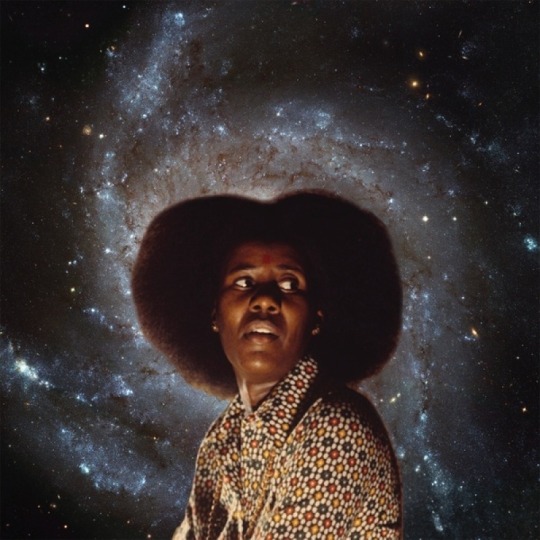
Alice Coltrane (1937-2007) is famous for her contributions to jazz music as a pianist, organist, harpist, and composer. She was a key figure in the development of spiritual jazz, a subgenre of jazz music that emphasizes spiritual and meditative qualities, and incorporated elements of Indian classical music into her compositions.
She married the legendary saxophonist John Coltrane in 1965, and played piano and harp on some of his later albums, including "Ascension" and "Meditations". After John Coltrane's death in 1967, Alice Coltrane began to explore her own musical vision, incorporating elements of Indian classical music, African music, and gospel music into her compositions.
In addition to her musical achievements, Alice Coltrane was also known for her spiritual pursuits. She became a devotee of the Indian guru Sathya Sai Baba and founded the Vedantic Center, a spiritual community in California. She also established the Sai Anantam Ashram in Agoura Hills, California, where she lived and recorded until her death in 2007.
Alice Coltrane's innovative approach to jazz music, her incorporation of diverse musical traditions, and her spiritual pursuits have made her a revered figure in the jazz world and beyond.
(Satchidananda refers to Sri Swami Satchidananda, an Indian guru who gained fame in the West for his teachings on yoga and spirituality.)
15 notes
·
View notes
Text

Alice Coltrane. Ptah, the El Daoud. 1970.
3 notes
·
View notes
Text
well, as is tradition (well it is now) here is every album i heard for the first time in 2024
polygondwanaland (king gizzard and the lizard wizard) - 4
hawks & doves (neil young) - 6
american stars n bars (neil young) - 4
tonight's the night (neil young) - 9
zuma (neil young) - 8
let it bleed (rolling stones) - 7
after the gold rush (neil young) - 9
harvest (neil young) - 7
trans (neil young) - 8
love in tyburn's shade (without history) - 7
weld (neil young) - 10
on the beach (neil young) - 9
gentle giant (gentle giant) - 7
way down in the rust bucket (neil young) - 7
white light/white heat (velvet underground) - 7
hitchhiker (neil young) - 7
neil young (stephen stills) - 7
everybody knows this is nowhere (neil young) - 9
comes a time (neil young) - 7
live rust (neil young) - 8
acquiring the taste (gentle giant) - 6
for a moment (jennifer reisner) - 5
the whaler (home is where) - 6
live the dream (ramshackle glory) - 8
shadows in the night (bob dylan) - 9
captain my captain (team dresch) - 6
the royal scam (steely dan) - 5
blue valentine (tom waits) - 7
sketches of spain (miles davis) - 8
shleep (robert wyatt) - 7
the geese and the ghost (anthony phillips) - 6
cured (steve hackett) - 5
highly strung (steve hackett) - 2
chomp (pylon) - 7
re-ac-tor (neil young) - 8
buffalo springfield (guess) - 6
present (van der graaf generator) - 5
real time (vdgg) - 7
trisector (vdgg) - 6
live at the paradiso (vdgg) - 8
nassau 1976 (david bowie) - 7
everybody's rockin' (neil young) - 3
old ways (neil young) - 4
now he sings, now he sobs (chick corea) - 8
landing on water (neil young) - 8
life (neil young) - 4
homegrown (neil young) - 8
burnt weeny sandwich (frank zappa) - 7
this note's for you (neil young) - 8
bluenote cafe (neil young) - 5
in a silent way (miles davis) - 6
franks wild years (tom waits) - 7
red apple falls (smog) - 7
radio city (big star) - 8
long may you run (stills-young band) - 3
for executive meeting (paranoid style) - 6
journey in satchidananda (alice coltrane) - 9
eldorado (neil young) - 5
freedom (neil young) - 8
a treasure (neil young) - 7
ragged glory (neil young) - 8
arc (neil young) - 5
monk's dream (thelonious monk) - 5
come on pilgrim (pixies) - 7
surfer rosa (pixies) - 6
good (morphine) - 9
a grounding in numbers (vdgg) - 5
ptah the el daoud (alice coltrane) - 5
earthling (david bowie) - 7
patterns in the sky (fisher thing) - 6
reality (david bowie) - 6
cracked actor (david bowie) - 3
tin machine (tin machine) - 5
ziggy stardust: the motion picture (david bowie) - 9
tonight (david bowie) - 2
best album - weld (tonight's the night in studio)
best songs:
3. bring me the disco king (david bowie)
2. from here to utopia (ramshackle glory)
tired eyes (neil young)
happy new year!
0 notes
Text

Fresh Listen - Alice Coltrane, Ptah, the El Daoud (Impulse! Records, 1970)
(Some pieces of recorded music operate more like organisms than records. They live, they breathe, they reproduce. Fresh Listen is a periodic review of recently and not so recently released albums that crawl among us like radioactive spiders, gifting us with superpowers from their stingers.)
I like to think that Alice Coltrane's Ptah, the El Daoud found me, in a nondescript cardboard box on the floor of another used record shop in Little Rock, Arkansas.
Already a little discouraged by by experience at Ugly Mike's, I was prepared for additional disappointment when I pulled up to the stall at the strip mall where Been Around Records and CD's was located. I was having a particularly disheartening phone conversation about work while I parked my car, and this pure quest of record digging I'd established in my mind felt tainted with anxiety about my job. Trapped in this headspace, my journey now felt like a chore, some box to be checked instead of an opportunity for wonder.
I couldn't find much on the shelves, but that was par for the course. Sheathed in plastic, the records were mostly overpriced, and if I was going to find the room in my checked bag on the way back to Hawai'i, I wanted either certified quality or a reasonable price point. In between racks of CD's I saw a row of cardboard boxes with a Mandrill cover exposed, so I bent my creaky knees and perused. Some gems: Hugh Masekela, Albert Ayler and, in a sleeve that no longer pocketed the LP as it should, and with a cover of orange background illuminating rodent god in sarcophagus embedded within carapace of scarab, the image still vibrant after years of friction sliding between other shelved records, Alice Coltrane's Ptah, the El Daoud. I hadn't yet heard any of the songs from the album, but it had been produced in 1970 and I was intrigued by Coltrane's collaborators: Ron Carter on bass, Pharaoh Sanders and Joe Henderson on saxophones and flutes, and Ben Riley on drums. The album immediately seemed worth its weight in luggage space.
My heart fell when I brought the album, along with a stack of other records I'd pulled from the box, to the cash register. The owner didn't technically own the records; someone had just dropped them off, and he needed to pick out the ones he thought he could sell. After a second of consideration, though, he just shrugged and rang the music up on a sliding price scale according to how scratchy they sounded, inspecting each on a turntable on the counter.
Since then, on and off for the great part of a year, I have been absorbed in Ptah, the El Daoud, which references an Egyptian god and the title of "Beloved." It is a fortress of a record; only four songs, two of them coming in at thirteen minutes, bookended by the title track and the equally dense "Mantra." Fortresses exist to protect people and things of great value, and within the depths of the fortress of Ptah, the El Daoud, there is a beautiful princess who reveals herself in two of the most sympathetic and and gorgeous jazz compositions in the canon: "Turiya and Ramakrishna" and "Blue Nile."
Ron Carter, an essential partner throughout the album, summons the first track "Ptah, the El Daoud" with a walking bassline onto which drummer Ben Riley adds a martial beat, as if announcing the Beloved with great fanfare, a train of camels and carts and wagons and carriages and masked mercenaries on foot, marching from the dunes of the desert onto the flagstones of the town. While Carter's bass and Coltrane's piano are more or less simpatico throughout the entire recording, it's little more difficult to get a lock on Henderson and Sanders. After the commanding opening theme, played in close harmony, each of their solos seems taken as if in a vacuum, as if transposed or transposable from or onto another tune altogether, no obvious narrative or intent .At one point, there a a few seconds of Sanders, who comes through the album on the right speaker, simply riding one squawking key of his sax. One can hear an in-time struggle to complement Coltrane and her piano meaningfully, and through multiple listens you appreciate the struggle. Riley's drum solo near the end of "Ptah, the El Daoud" breaks down the formerly purposeful caravan into its most primitive components, footsteps overlapping, tripping among themselves, as the caravan plods to the conclusion.
Sanders and Henderson lay out from "Turiya and Ramakrishna" altogether, though there are some sleigh bells shaken here and there. Despite their absence, or maybe because of it, Coltrane manifests an inspired and tender performance, revealing no less than what must be a beautiful soul. It rises up from between the piano keys, a voice of notes undeniably human in its joy and wonder and unfulfilled desire. Carter, not one to solo extensively, finds himself with the space to wander, as Coltrane gently lays out her chords so that he may never lose his way. "Turiya and Ramakrishna" is a remarkable example of the musicians' sympathy for each other.
What follows on Side Two is another mini-masterpiece: "Blue Nile," in which Coltrane expertly makes love to the harp while Henderson and Sanders, saxophone giants, exchange the horns for woodwinds and, in deference to Coltrane's vision, play very, very small. Though the song has a floating quality, it's neither mystical nor abstract. It's a space of great spiritual peace, hard-won, tall trees planted firmly in the ground, the leaves of which the air flows through in varying currents. Pleasantly disorienting is Carter's bass, which stretches and compresses time between measures, as if measures were only a suggested guideline.
"Mantra" carries forward the focused, heavy jazz dirge of the title track, with Coltrane splashing the listener with colorful, expansive piano chords, while Henderson and Sanders attempt various maneuvers to work their way into the conversation. As the song closes, Coltrane blends all the colors into a single drone, working against Carter's throbbing bass that intensifies as Riley locks in and the sleigh bells return, an extended finale when all becomes one, and Coltrane builds the expectancy until the grand consummation.
I don't exaggerate by proposing Coltrane's Ptah, the El Daoud has become one of the most important records in my listening life. The life force that may be drawn from a a second-hand, not-exactly-for-sale piece of scratched vinyl I wouldn't have considered had I not carried a certain headspace with me at a certain time.
0 notes
Text
Ginger Radio Hour #037

Show Notes April 4, 2023
Listen to archived episode.
Theme: Love and forgiveness.
Featured: Writer, artist, and gardener Marc Hamer has a new book called Spring Rain: A Life Lived in Gardens. In many ways, it's a guide book for a life well-lived, given up to love and forgiveness. Our conversation veers from spiritual to practical and back again, focusing on shade plants, the outdoors, books, and childhood.
Playlist:
Herbie Hancock “Watermelon Man” Album: Head Hunters 1973
Makaya McCraven “The Fours” Album: In These Times 2022
Alice Coltrane “Blue Nile” Album: Ptah the El Daoud 1970
Dinah Washington “Salty Papa Blues” Album: A Slick Chick (on the Mellow Side) 1983
Duke Ellington “El Gato” Album: Duke Ellington’s 70th Birthday Concert (Recorded Live in England) 1969
Professor Longhair “Go To The Mardi Gras” Album: Meet Me At Mardi Gras 2012
The Quintet “Salt Peanuts (Live)” Album: The Quintet: Jazz At Massey Hall 2002 (Recorded in 1953)
Cannonball Adderley and John Coltrane “The Sleeper” Album: Cannonball & Coltrane 1959
#ginger radio hour#community radio#music#jazz#gardening#forgiveness#spring#catskills#hudson valley#inspiration
1 note
·
View note
Video
youtube
Alice Coltrane’s “Turiya And Ramakrishna”
16 notes
·
View notes
Photo
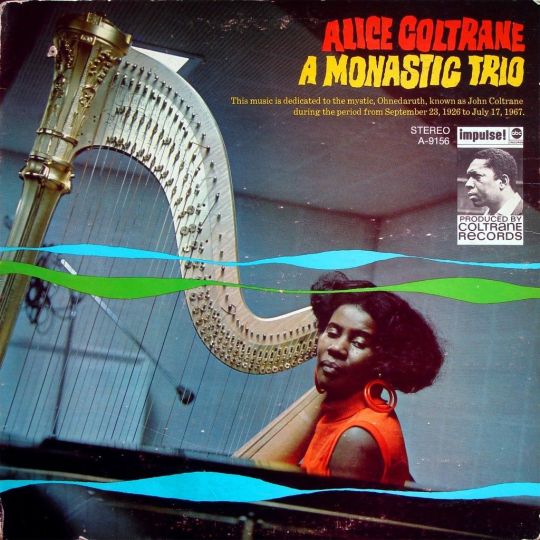

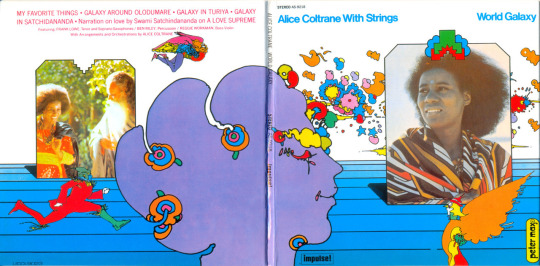
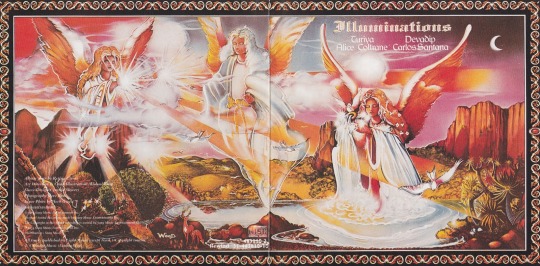

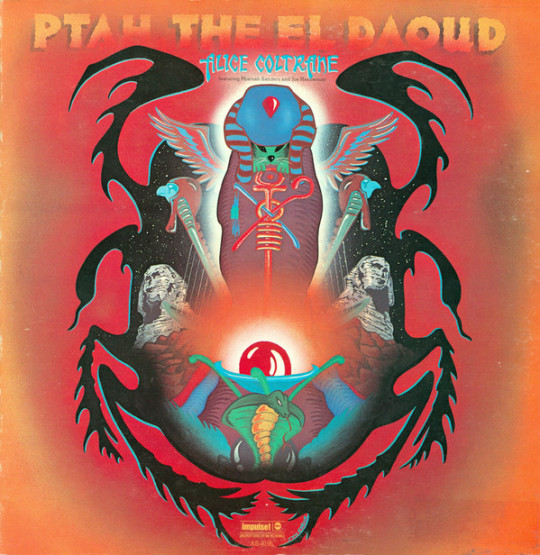
Alice Coltrane Turiyasangitananda, 1937-2007
#alice coltrane#coltrane#jazz#ashram#espiritual#a monastic trio#huntington ashram monastery#world galaxy#illuminations#eternity#ptah the el daoud#records#vynil records
3 notes
·
View notes
Text
#blue nile#alice coltrane#harp#ptah the el daoud#impulse#1970#international jazz day#30 april 2020#Spotify
2 notes
·
View notes
Video
youtube
"Turiya And Ramakrishna" - Alice Coltrane (Ptah, the El Daoud - 1970)
#wow#so good#alice coltrane#too good to be true#turiya and ramakrishna#muito bom para ser verdade#uau#bom demais#music#música#jazz#ptah the el daoud#1970#beauty#lindo#lovely#soulful#beautiful#amo#coltrane#like wooow#1970 music#1970s music
1 note
·
View note
Photo

Alice Coltrane :: 16mm Documentary
Culled from a 1970 documentary created for a segment of the Black Journal television program, this unearthed 16mm color film finds Alice Coltrane between the albums Huntington Ashram Monastery, and Ptah, the El Daoud.
Captured three years after the death of John Coltrane, the piece begins in media res outside the Long Island, NY home the artist shared with her late husband and children. In a floating voiceover, Coltrane reflects on matters of the spiritual and beyond, as we catch a glimpse of the family’s domestic life on the property. A scant yet powerful fifteen minutes, things soon turn to music as the film shifts to a grip of rare, live footage of Coltrane and Pharoah Sanders getting free in performance. Highly recommended.
106 notes
·
View notes
Text
youtube
Alice Coltrane ft. Pharoah Sanders & Joe Henderson - Ptah, The El Daoud (1970)
6 notes
·
View notes
Text
Pharoah Sanders – Live In Paris (1975) (Lost ORTF Recordings)
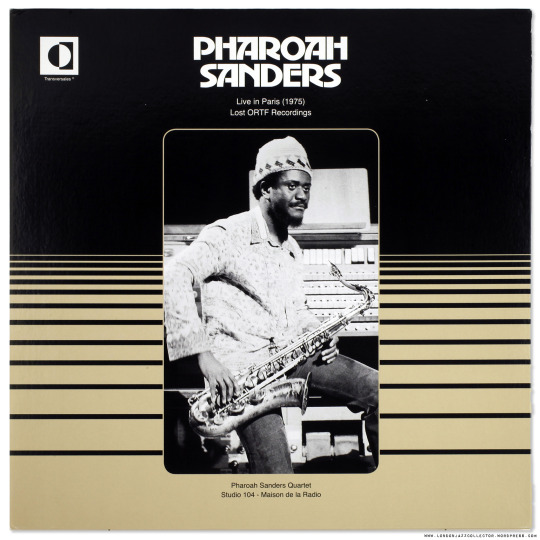
“When Pharoah Sanders played tenor saxophone with John Coltrane in the 1960s, his tone was harsh and wild. Soloing alongside Coltrane on records like Ascension, Om, and Live in Japan, Sanders’ horn would shriek and howl and cry, reaching a pitch of earth-shaking intensity on pieces that pushed jazz to the limits of legibility. But after Coltrane’s death in 1967, Sanders began exploring a different path. Playing with Alice Coltrane on Ptah, the El Daoud and Journey in Satchidananda, and on his own albums for the Impulse! label, his sound was still searching, but now it was lyrical, and his musical settings often included trance-inducing grooves. After a half-decade enduring the blast furnace of free jazz, Sanders’ style grew more spiritual and cosmic and started looking to music from around the globe for inspiration. ...”
Pitchfork
W - Live in Paris (1975) (Lost ORTF Recordings)
LondonJazzCollector (Audio/Video)
YouTube: Live In Paris (1975 - Album)
2015 December: Maleem Mahmoud Ghania With Pharaoh Sanders - The Trance Of Seven Colors (1994), 2016 January: Ptah, The El Daoud - Alice Coltrane & Pharoah Sanders (1970), 2016 November: Tauhid (1967), 2017 May: The Pharoah Sanders Story: In the Beginning 1963-1964, 2017 November: Let Us Now Praise Pharoah Sanders, Master of Sax, 2018 February: Anthology: You've Got to Have Freedom - Pharoah Sanders (2005), 2018 February: James Blood Ulmer & Pharoah Sanders - Live 2003, 2018 May: How Pharoah Sanders Brought Jazz to Its Spiritual Peak with His Impulse! Albums, 2019 January: Africa (1987), 2021 December: Promises - Floating Points, Pharoah Sanders and the London Symphony Orchestra
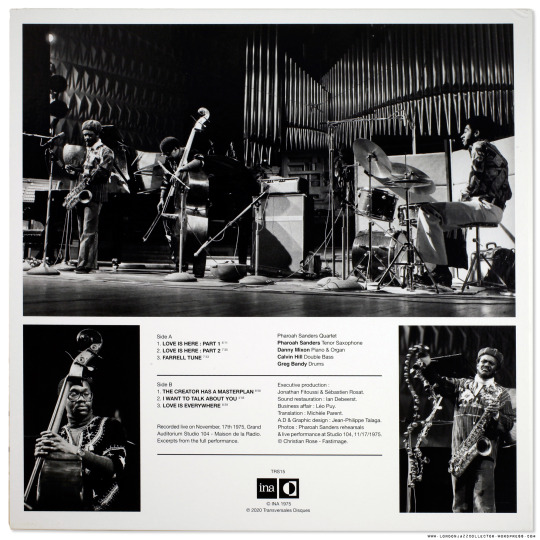
13 notes
·
View notes
